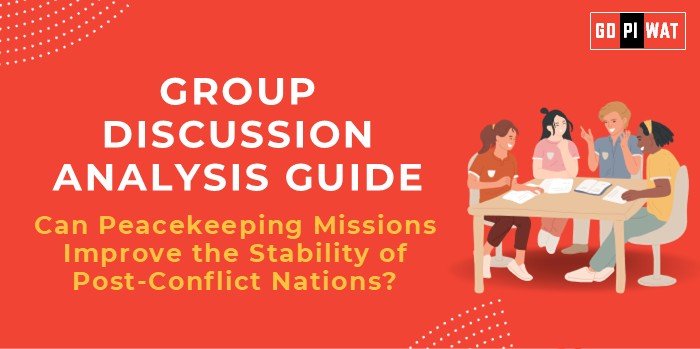📋 Group Discussion Analysis Guide: Can Peacekeeping Missions Improve the Stability of Post-Conflict Nations?
🌐 Introduction to the Topic
📖 Opening Context
Peacekeeping missions are a cornerstone of the United Nations’ (UN) efforts to maintain global stability, particularly in nations recovering from conflict. They play a pivotal role in fostering peace agreements, rebuilding governance, and ensuring humanitarian aid delivery.
📜 Topic Background
Originating in 1948, UN peacekeeping operations aim to provide a bridge between conflict resolution and long-term stability. With over 70 missions conducted worldwide, their impact remains a subject of debate, particularly as post-conflict nations often grapple with governance, economic recovery, and societal reconciliation.
📊 Quick Facts and Key Statistics
- 🌍 Active Missions: 12 UN peacekeeping missions ongoing as of 2024, including in Mali, South Sudan, and Lebanon.
- 💰 Budget: $6.45 billion allocated for UN peacekeeping operations (2023).
- 👥 Personnel: 87,000+ personnel deployed globally, representing over 120 countries.
- 📉 Success Rate: Studies suggest peacekeeping reduces conflict recurrence by 50% within the first five years.
- 🏅 Global Impact: Nations like Liberia and Sierra Leone cite peacekeeping as instrumental in post-war recovery.
🤝 Stakeholders and Their Roles
- 🏛️ United Nations: Oversees operations, mandates, and funding.
- 🌐 Host Governments: Collaborate to implement peace agreements.
- 💡 Contributing Nations: Provide troops, police, and financial resources.
- 📢 Local Communities: Engage in reconciliation and rebuilding efforts.
- 🎗️ Non-Governmental Organizations: Support humanitarian and developmental programs.
🏆 Achievements and Challenges
✨ Achievements
- 📉 Reduced Recurrence: Operations in Cambodia and Namibia have transitioned nations to stability.
- 🏛️ Governance Support: Helped Liberia establish democratic institutions post-civil war.
- 🛡️ Humanitarian Aid: Missions in South Sudan safeguarded millions during crises.
⚠️ Challenges
- 💸 Lack of Resources: Insufficient funding hinders mission scope.
- ⚖️ Complex Mandates: Balancing security and development tasks.
- ❗ Controversies: Allegations of misconduct and accountability lapses.
🌍 Global Comparisons
- ✅ Success: UN intervention in East Timor laid groundwork for independence in 2002.
- ⚠️ Challenges: Limited success in DR Congo due to ongoing militia activity.
📚 Case Study
Liberia: The UN mission in Liberia (UNMIL, 2003–2018) supported disarmament and national elections, leading to two decades of peace.
💡 Structured Arguments for Discussion
- ✅ Supporting Stance: “Peacekeeping missions have significantly lowered the chances of conflict relapse and fostered democratic governance.”
- 🛑 Opposing Stance: “Peacekeeping often fails due to resource constraints and lack of local ownership.”
- ⚖️ Balanced Perspective: “While peacekeeping missions play a stabilizing role, their success hinges on robust support and alignment with local priorities.”
🎯 Effective Discussion Approaches
- 📊 Data-Driven: “UN peacekeeping has halved conflict recurrence globally.”
- 📚 Case Study Reference: “Liberia’s recovery is a testament to successful peacekeeping.”
⚙️ Counter-Argument Handling
- 🏛️ “While allegations against peacekeepers exist, stricter accountability measures are reducing misconduct.”
🧠 Strategic Analysis of Strengths and Weaknesses
- 💪 Strengths: International legitimacy, diverse global support, flexible deployment capabilities.
- 🛠️ Weaknesses: Funding gaps, limited enforcement power, operational challenges.
- 🌟 Opportunities: Enhanced regional partnerships, leveraging technology for monitoring.
- ⚠️ Threats: Rising nationalism, funding withdrawal, local resistance.
🏫 Connecting with B-School Applications
📚 Real-World Applications
- 🌍 Managing resources in conflict-prone settings.
- 💼 Understanding multilateral negotiations.
🎓 Sample Interview Questions
- ❓ “What lessons can business leaders learn from peacekeeping in resource management?”
- ❓ “How can private-sector expertise support peacekeeping missions?”
📘 Insights for B-School Students
- 💡 Build competencies in global crisis management and international cooperation.


